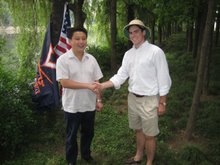
The Western Hemisphere met the Western Hemisphere today in the Ritz Carlton's famous Western Grocery Store. Edward Bennett and I needed cheese, port, and coffee. After dropping by the cloth market and continuing our spending spree on tailor-made clothes, we headed for the safe haven that tantalized us with rumors of milk products and aperitifs.
Along the way we learned that many visitors to Shanghai never actually leave the confines of this sprawling hotel complex. Indeed, the Ritz has its own Starbucks, its own pharmacy, Shanghai's only Western grocery store, and God alone knows what else. In every direction, long formations of Americans paraded from their buses to the safety of quality-controlled bars with air-conditioning. And every one of these good old boys sported a large Starbucks drink as their exposed chubby legs reflected the shimmering night lights of the bustling mothership that is this hotel.
With a small picnic in hand, we taxiied to the Bund (Shanghai's old financial district by the water), enjoyed our first course, and I saw Shanghai's nighttime skyline for the first time. A group of four Chinese college students admired our picturesque spread on one of the stone benches and probably thought that we would be an easy target for tea-racketeering. Fortunately, I surprised them with language skills and they realized, of course, that we were in fact old China hands. They had seen Gone with the Wind so I took the opportunity to explain to them how America's plantation life continues to thrive, and that slavse labor was paying for our trip to China.
We then strolled along the large Huangpu River through the crowd of beggars and lovers to our destination, "M on the Bund", recommended by the Venerable Doc. Shurmer. Seated on the terrace, we both reflected that the evening had so far been our most enjoyable in Shanghai. And then we realized that our evening had approximately nothing to do with the Orient. We drank Australian wine, ate Australian lamb, dined in a European colonial building, looked out upon a European trading city built in the style of the West, our delicious bread and cheese had come directly from Europe to the Ritz, and we were both, of course, Americans. I know what you're thinking and I took the liberty of asking - no, they didn't have a single pair of chopsticks in the establishment.
Our waiter, however, provided the tipping point- a Scotsman! On a whim, I asked him his family name. Yes, he was of the clan Fraser from Inverness. Yes, he was a distant cousin of myself and even Edward (whose Grandmother was a Fraser)! Yes, his
brother is the current Clan
Chief of my people! Yes, this fellow lives in our ancestral home. Yes, he and his brother have just launched the Fraser Clan's new line of Scotch Whisky - "The Old Fox" - in memory of our common ancestor Simon Fraser (the last to be executed at the Tower of London). Shanghai, of all places.
There is much to be said for the colonial approach to Shanghai. Let alone the fact that our dinner cost approximately sixty times the amount that a meal on the street would cost (don't worry Mom - dinner was still reasonable). Order tailored clothes in the morning, dine on lamb in the evening, and speak a little Chinese to the cab driver on the way back to the dormitory.
 For some reason I love flags. Here is pictured the UVA flag in Beijing's Forbidden City. By this time the plainclothes policemen had lost interest and I felt safe in proudly swinging this fine emblem of Western pride.
For some reason I love flags. Here is pictured the UVA flag in Beijing's Forbidden City. By this time the plainclothes policemen had lost interest and I felt safe in proudly swinging this fine emblem of Western pride.













